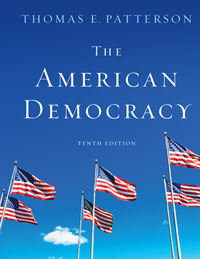 
The American Democracy, 10th Edition (Patterson)Chapter 7:
Political Participation: Activating the Popular WillChapter Overview
The focus of this chapter is on political participation in its various forms. The author highlights voting as the most common form of political activity, and examines the impact of registration, civic duty, party competition, socioeconomic status, and other important factors on voter turnout. The paradox of high political participation yet relatively low levels of voter turnout in the United States is explored. Differences in the extent of political participation are examined, and the effects of both individual and systemic factors are emphasized. The main points of this chapter include:
- Voter turnout in U.S. elections is low in comparison with that of other Western democracies. The reasons include the peculiar nature of U.S. election laws, particularly those pertaining to registration requirements and the scheduling of elections.
- Most citizens do not participate actively in politics in ways other than voting. Only a minority of Americans can be classified as political activists. Nevertheless, Americans are more likely than citizens of other democracies to contribute time and money to political and community organizations.
- Most Americans make a distinction between their personal lives and public life. This outlook reduces their incentive to participate and contributes to a pattern of participation dominated by citizens of higher income and education.
 |  |
|

















